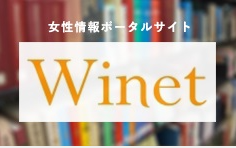International Cooperation
- HOME
- International Cooperation
- International Seminar
- FY2014 Seminar for Gender Equality Officers and Women Leaders in the Asia Pacific Region
International Seminar
- Event Report
-
FY2014 Seminar for Gender Equality Officers and Women Leaders in the Asia Pacific Region
Date:September 29 to October 3, 2014
The National Women's Education Center (NWEC) held its 2014 Seminar for Gender Equality Officers and Women Leaders in the Asia Pacific Region from September 29 to October 3 under the theme of ICT and Women's Empowerment, with the participation of nine women leaders from five countries in the Asia Pacific region (Cambodia, India, the Philippines, Thailand and Vietnam), each of whom works in a national machinery or non-governmental organization.
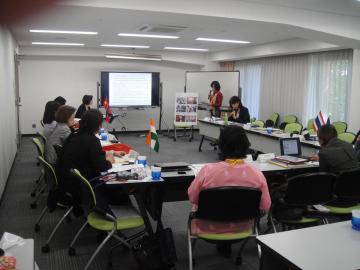 1.Country Report Presentation
1.Country Report Presentation
On the first day of the Seminar, the group of participants attended the lecture on Creating Women’s Information by Ms. Reiko Aoki of Japan Women’s Watch. Afterward, they had a tour of the Information Center for Women's Education and Women's Archives Center. They presented country reports and poster sessions, sharing information on the latest gender equality policies in the five Asian countries and issues involved in the promotion of female engagement in the ICT field.
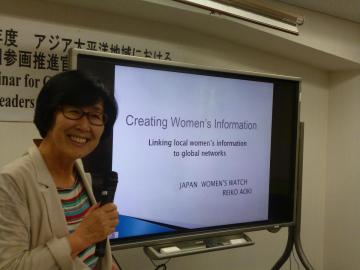 2.Lecture by Ms. Aoki of the Japan Women's Watch
2.Lecture by Ms. Aoki of the Japan Women's Watch
From day three of the Seminar, the venue shifted to Tokyo, where the participants attended lectures at Lighthouse: Support Center for Human Trafficking Victims, an organization working toward preventing sexual exploitation, and attended a lecture by Ms. Aya Nanashima to learn about actual conditions in Japan, such as that Japan is included on the Tier 2 Watch List in the Trafficking in Persons Report issued by the U.S. State Department's Office to monitor and combat trafficking in persons and that the number of young women getting caught up in sex-related offenses through the Internet and LINE has been increasing recently.
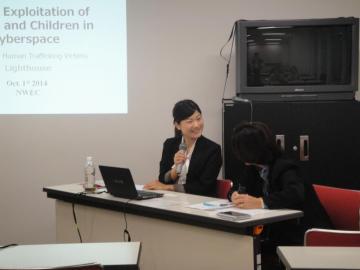 3.Lecture by Ms. Nanashima of the NPO Lighthouse Support Center for Human Trafficking Victims
3.Lecture by Ms. Nanashima of the NPO Lighthouse Support Center for Human Trafficking Victims
In the afternoon, the group visited the Japan Association for Women’s Education (JAWE): after the lecture by the President Yasuko Muramatsu entitled ICT's from Gender Perspectives, the Chief of the association, Ms. Azusa Kurosawa, explained the history and operations of JAWE. Dr. Muramatsu’s statement that “I want to emphasize the term ICT, which places priority on communication between people, rather than IT, which is primarily used for industrial promotion” in particular, seemed to resonate with many of the participants, who nodded their heads approvingly.
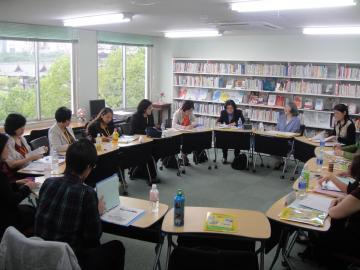 4.Lectures at the Japan Association for Women's Education
4.Lectures at the Japan Association for Women's Education
On the fourth day, Professor Rika Tanioka from the School of Letters, Department of Media Studies of Tokai University, gave a lecture titled “Media and Gender." This was followed by an active discussion about the fact that there are only a few women that hold administrative positions in Japanese media industry and the development of gender division of role depicted in TV commercials, while comparing conditions in Japan with other countries.
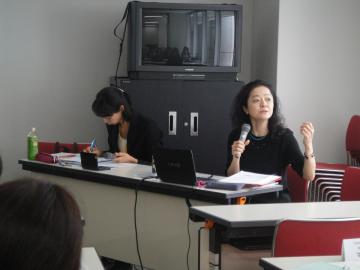 5.Lecture by Prof. Tanioka
5.Lecture by Prof. Tanioka
Afterward, the group moved to Kawagoe Girls' Senior High School in Saitama prefecture, which has been designated as a Super Science High School (SSH); after listening to a presentation of the school’s profile in English by Vice Principal Hiroshi Kuwahara, the participants were invited to observe various extracurricular activities to deepen their understanding of the Japanese educational systems.
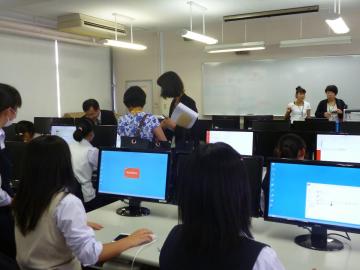 6.Visit to Kawagoe Girls' Senior High School in Saitama prefecture
6.Visit to Kawagoe Girls' Senior High School in Saitama prefecture
On the last day, Ms. Yoko Kobayashi of NTT Communications Corporation introduced the company’s initiatives in “Support for Women in home-based employment by utilizing ICT.” Participants actively participated and asked questions about the company’s efforts taking employees’ diversified background, including single-parent households and persons with disabilities, into consideration.
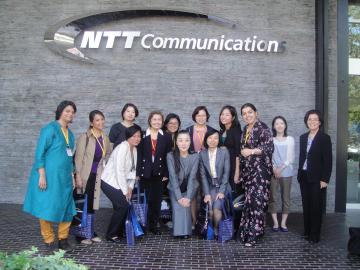 7.In front of the building of the Headquarters of NTT Communications Corporation
7.In front of the building of the Headquarters of NTT Communications Corporation
The participants were able to make good use of the spare moments between lectures and visits, taking the opportunity to learn about Japanese culture as well. They attended activities at the Tea Ceremony club at Kawagoe Girls' Senior High School to experience Japan’s traditional culture firsthand, and later went on a walkabout in Kawagoe to take in the cityscape of Ko-edo (little Edo), which retains its character from the Edo period, and exposed themselves to Japanese history.
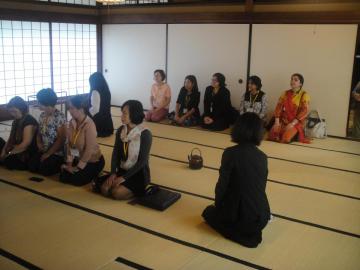 Experiencing a tea ceremony at Kawagoe Girls' Senior High School
Experiencing a tea ceremony at Kawagoe Girls' Senior High School
We would like to express our heartfelt gratitude to all those who kindly agreed to host the participants during the Seminar, and to our lecturers.
Country Reports (PDF)
International Cooperation
- International Seminar
- FY2019 Seminar for Gender Equality Officers and Women Leaders in the Asia Region
- FY2018 Seminar for Gender Equality Officers and Women Leaders in the Asia Region
- FY2017 Seminar for Gender Equality Officers and Women Leaders in the Asia Region
- FY2016 Seminar for Gender Equality Officers and Women Leaders in the Asia Region
- FY2015 Seminar for Gender Equality Officers and Women Leaders in the Asia Pacific Region
- FY2014 Seminar for Gender Equality Officers and Women Leaders in the Asia Pacific Region
- FY2013 Seminar for Gender Equality Officers and Women Leaders in the Asia Pacific Region
- FY2012 Seminar for Gender Equality Officers and Women Leaders in the Asia Pacific Region
- FY2011 Seminar for Gender Equality Officer and Women Leaders in the Asia Pacific Region
- FY2010 Empowerment Seminar for Women Leaders in the Asia Pacific Region
- FY2009 Empowerment Seminar for Women Leaders in the Asia Pacific Region Final Report
- FY2008 Empowerment Seminar for Women Leaders in the Asia Pacific Region
- FY2007 Empowerment Seminar for Women Leaders in the Asia Pacific Region
- FY2006 Empowerment Seminar for Women Leaders in the Asia Pacific Region
- NWEC Global Seminar
- FY2025 NWEC Global Seminar: Addressing Technology-Facilitated Gender Based Violence (TFGBV): Approaches to Eradicate the Invisible Harm
- FY2024 NWEC Global Seminar: Gender Equality and Care
- FY2023 NWEC Global Seminar: Gender Mainstreaming & Strengthening Institutional Mechanism with Gender Perspective
- FY2022 NWEC Global Seminar: Does Digital Technology Advance Gender Equality?
- FY2021 NWEC Global Seminar: Combating Gender-Based Violence – “Building Back Better” from the Covid-19 Crisis
- FY2020 NWEC Global Seminar: Covid-19 and Gender
- FY2019 NWEC Global Seminar: Gender and Media
- FY2018 NWEC Global Seminar: Promotion of the Advancement of Women - What Japan can learn from Iceland about Gender Equality?
- FY2017 NWEC Global Seminar: Promotion for Advancement of Women Lessons from Germany
- FY2016 NWEC Global Seminar: Promotion for Advancement of Women –Lessons from Europe
- FY2015 International Symposium: Gender Equality and Women's Empowerment
- FY2014 International Symposium: Keys to Diversity and Women's Leadership
- FY2013 NWEC International Symposium:Gender Equality for Men
- FY2012 NWEC International Symposium:To Make a Society without Violence against Women a Reality
- FY2011 NWEC International Symposium
- FY2010 International Forum for Women's Empowerment
- FY2009 International Forum for Women's Empowerment
- FY2008 International Forum for Women's Empowerment Final Report3
- FY2008 International Forum for Women's Empowerment Final Report2
- FY2008 International Forum for Women's Empowerment Final Report1
- Cooperation with JICA
- FY2025 Knowledge Co-Creation Program (KCCP): "Promotion of Global Networking on Anti-Trafficking in Persons"
- FY2025 Knowledge Co-Creation Program "Eradicating Sexual and Gender-Based Violence (SGBV)"
- FY2025 Knowledge Co-Creation Program: Bangladesh “Strengthening Capacity to Address Gender-Based Violence"
- FY2024 Knowledge Co-Creation Program on "Promotion of Global Networking on Anti-Trafficking in Persons"
- FY2024 Knowledge Co-Creation Program "Eradicating Sexual and Gender-Based Violence (SGBV)"
- FY2023 Knowledge Co-creation Program "Promotion of Networking among ASEAN Countries on Anti-Trafficking in Persons”
- FY2023 Knowledge Co-Creation Program "Eradicating Sexual and Gender-Based Violence (SGBV)"
- FY2022 Knowledge Co-creation Program "Promotion of Networking among ASEAN Countries on Anti-Trafficking in Persons”
- FY2022 Knowledge Co-Creation Program "Eradicating Sexual and Gender-Based Violence (SGBV)"
- FY2021 Knowledge Co-creation Program "Promotion of Networking among ASEAN Countries on Anti-Trafficking in Persons”
- FY2020 Knowledge Co-creation Program "Promotion of Networking among ASEAN Countries on Anti-Trafficking in Persons”
- FY2019 Knowledge Co-creation Program "Promotion of Networking among ASEAN Countries on Anti-Trafficking in Persons”
- FY2018 Knowledge Co-creation Program "Promotion of Networking among ASEAN Countries on Anti-Trafficking in Persons”
- Issue-specific Training “Seminar on Promotiom of Networking among ASEAN Countries on Anti-Trafficking in Persons”
- Basic Information-Gathering Survey/Workshop Seminar on the Economic Independence for Women in Central America and the Caribbean (El Salvador/Dominican Republic)
- Regional Gender Seminar in Central and South America
- 2015 Issue-specific Training "Seminar on Promotion of Networking among Asian Countries on Anti-Trafficking in Persons"
- Seminar on the Promotion of Education for Girls and Women II
- International Conference/International Exchange
- Online meeting with Seisen International School elementary students
- Visitor: Mansfield Fellows
- Visitor:JICA Knowledge Co-Creation Program (KCCP) on "Women's Empowerment through Business for Central American Integration System (SICA) Member Countries"
- The 68th Session of the Commission on the Status of Women
- Visitor: Madam Sustjie Mbumba, First Lady of the Republic of Namibia
- Workshop of commemorating the donation of the Beate Shirota Gordon archive materials
- Meeting with Korean Women’s Development Institute (KWDI)
- The Coalition of Finnish Women's Associations (NYTKIS) Secretary General Ms. KAKKOLA’s Courtesy Call to Foreign Minister KAMIKAWA
- The Coalition of Finnish Women's Associations (NYTKIS) Secretary General Ms. KAKKOLA’s Japan Visit Program
- The 67th Session of the Commission on the Status of Women
- NGO CSW67 Forum
- Webinar with Korean Women’s Development Institute (KWDI)
- The 66th Session of the Commission on the Status of Women (Hybrid format)
- Online meeting with international graduate students from the Appropriate Technology course at the University of Tsukuba
- The 65th session of the Commission on the Status of Women
- Lecture "The Beate Sirota Gordon Archives at Mills College"
- Participation in 2nd AGenT
- The 64th session of the Commission on the Status of Women
- Dr. Wang from National Taiwan University visits NWEC
- Japan Network of Women Engineers and Scientists and The Japan Inter-Society Liaison Association Committee for Promoting Equal Participation of Men and Women in Science and Engineering: 9th Japan Korea China Women Leaders Forum for Science & Technology
- Researcher from the KWDI visits NWEC
- Visit by a delegation from the Socialist Republic of Vietnam Ministry of National Defense
- Briefing on the Reykjavik Index for Leadership
- Women's Archives Center Exhibition "Beate Sirota Gordon and gender equality in Japanese Constitution"
- Visit from the Guangxi Women’s Federation
- Participation in the 63rd Session of the Commission on the Status of Women
- 7th Global Forum on Gender Statistics
- FY2018 International Symposium hosted by Korean Institute for Gender Equality Promotion and Education “Gender Equality at Schools”
- Visit from All-China Women’s Federation(ACWF)
- Participation in the 62nd Session of the Commission on the Status of Women
- The 14th KIGEPE International Symposium “Empowering Women’s Leadership: expanding influence and innovation”
- Participation in the 61st Session of the Commission on the Status of Women
- Visit from the Batis Center for Women
- 2011 Asia Women Eco-Science Forum (a forum of science and engineering leaders in Japan, China and Korea)
- The 60th Session of the Commission on the Status of Women
- The 59th Session of the United Nations Commission on the Status of Women
- The 58th Commission on the Status of Women
- The 57th Session of the United Nations Commission on the Status of Women
- International Symposium: Gender Awareness Education for Sustainable Development
- Thirtieth Anniversary Programs
- Attendance at the Ceremony Commemorating the 25th Anniversary of the Korean Women’s Development Institute (KWDI)
- Japanese-Filipino children (JFC)* from the Philippines-based NGO “DAWN” visit the Center
- Visitors from Abroad to NWEC
- Research report on Multicultural Family Support in South Korea
- Workshop on Gender and Education: Life-long Learning for Women’s Empowerment
- Lecture Delivered by a Visiting Researcher
- Connections: Bringing Together the Next Generation of Women Leaders in Science, Technology, Engineering and Mathematics
- Conclusion of Memorandum of Understanding on Exchange and Cooperation with the Ministry of Women's Affairs, Royal Government of Cambodia
- Visit to Japan by the Minister of Women’s Affairs of the Royal Government of Cambodia
- KIGEPE Delegation Visit
- Officials of Ministry of Information and Communications of the Socialist Republic of Vietnam visited NWEC
- The 56th Commission on the Status of Women
- Dr. Barker's visit
- Multidisciplinary Intellectual Exchange for Women Leaders from the United States, Japan, South Korea and the Philippines
- Courtesy visit to University of Hawai`i
- Delegation of Board for the Advancement of Women, Ministry of Finance of the Socialist Republic of Vietnam visited NWEC
- Visit Korean Women's Development Institute (KWDI)
- Report on Participation in the 5th World Social Forum on Migration
- A group led by the Vice President of the Korean Women's Development Institute visited NWEC
- A disaster management specialist from India visits the Center
- Visit to the Korean Institute for Gender Equality Promotion & Education (KIGEPE) and others
- Secretary of State, Ministry of Justice, Kingdom of Cambodia visited NWEC
- Research conducted in the Republic of the Philippines
- Research on the Comparative Study of the Gender Equality Policy in Southeast Asian Countries in the Kingdom of Cambodia
- Ochanomizu University and A Canadian Women’s Study Researcher visited NWEC
- Aigyung Yang, Research Fellow and Former Director of Strategy Board for Women Friendly Policies of the Korean Women's Development Institute (KWDI) Visits NWEC
- Delegation of the Ministry of Defense of the Socialist Republic of Vietnam visited NWEC
- Delegation from the Women and Development Center, of the Vietnam Women's Union, Visited NWEC
- The "7th Asia-Pacific Forum on Development and Gender" was held in Seoul, South Korea
- HOME
- International Cooperation
- International Seminar
- International Seminar
- FY2014 Seminar for Gender Equality Officers and Women Leaders in the Asia Pacific Region

